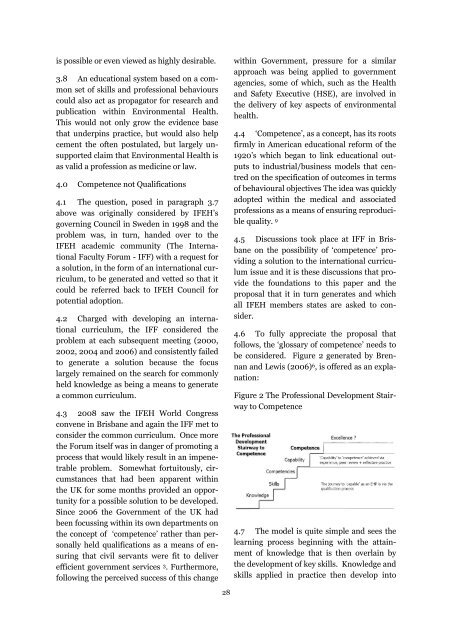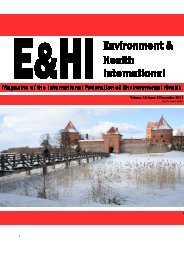ISSN 1683-3805
E&HI Volume 11, No. 1 2009 - International Federation of ...
E&HI Volume 11, No. 1 2009 - International Federation of ...
- No tags were found...
You also want an ePaper? Increase the reach of your titles
YUMPU automatically turns print PDFs into web optimized ePapers that Google loves.
is possible or even viewed as highly desirable.<br />
3.8 An educational system based on a common<br />
set of skills and professional behaviours<br />
could also act as propagator for research and<br />
publication within Environmental Health.<br />
This would not only grow the evidence base<br />
that underpins practice, but would also help<br />
cement the often postulated, but largely unsupported<br />
claim that Environmental Health is<br />
as valid a profession as medicine or law.<br />
4.0 Competence not Qualifications<br />
4.1 The question, posed in paragraph 3.7<br />
above was originally considered by IFEH’s<br />
governing Council in Sweden in 1998 and the<br />
problem was, in turn, handed over to the<br />
IFEH academic community (The International<br />
Faculty Forum - IFF) with a request for<br />
a solution, in the form of an international curriculum,<br />
to be generated and vetted so that it<br />
could be referred back to IFEH Council for<br />
potential adoption.<br />
4.2 Charged with developing an international<br />
curriculum, the IFF considered the<br />
problem at each subsequent meeting (2000,<br />
2002, 2004 and 2006) and consistently failed<br />
to generate a solution because the focus<br />
largely remained on the search for commonly<br />
held knowledge as being a means to generate<br />
a common curriculum.<br />
4.3 2008 saw the IFEH World Congress<br />
convene in Brisbane and again the IFF met to<br />
consider the common curriculum. Once more<br />
the Forum itself was in danger of promoting a<br />
process that would likely result in an impenetrable<br />
problem. Somewhat fortuitously, circumstances<br />
that had been apparent within<br />
the UK for some months provided an opportunity<br />
for a possible solution to be developed.<br />
Since 2006 the Government of the UK had<br />
been focussing within its own departments on<br />
the concept of ‘competence’ rather than personally<br />
held qualifications as a means of ensuring<br />
that civil servants were fit to deliver<br />
efficient government services 3 . Furthermore,<br />
following the perceived success of this change<br />
within Government, pressure for a similar<br />
approach was being applied to government<br />
agencies, some of which, such as the Health<br />
and Safety Executive (HSE), are involved in<br />
the delivery of key aspects of environmental<br />
health.<br />
4.4 ‘Competence’, as a concept, has its roots<br />
firmly in American educational reform of the<br />
1920’s which began to link educational outputs<br />
to industrial/business models that centred<br />
on the specification of outcomes in terms<br />
of behavioural objectives The idea was quickly<br />
adopted within the medical and associated<br />
professions as a means of ensuring reproducible<br />
quality. 9<br />
4.5 Discussions took place at IFF in Brisbane<br />
on the possibility of ‘competence’ providing<br />
a solution to the international curriculum<br />
issue and it is these discussions that provide<br />
the foundations to this paper and the<br />
proposal that it in turn generates and which<br />
all IFEH members states are asked to consider.<br />
4.6 To fully appreciate the proposal that<br />
follows, the ‘glossary of competence’ needs to<br />
be considered. Figure 2 generated by Brennan<br />
and Lewis (2006) 6 , is offered as an explanation:<br />
Figure 2 The Professional Development Stairway<br />
to Competence<br />
4.7 The model is quite simple and sees the<br />
learning process beginning with the attainment<br />
of knowledge that is then overlain by<br />
the development of key skills. Knowledge and<br />
skills applied in practice then develop into<br />
28



